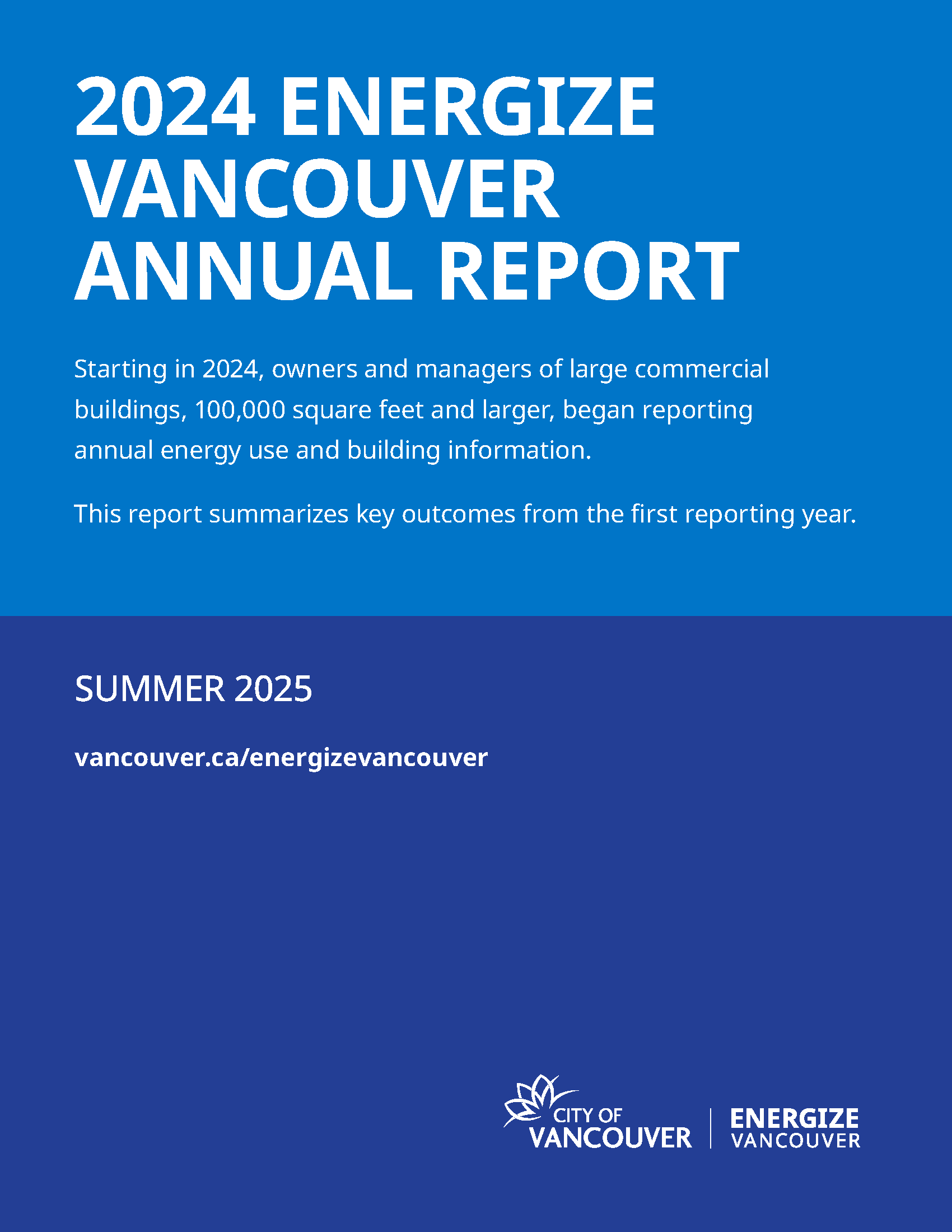First Energize Vancouver Annual Report now available
Review the 2024 Energize Vancouver Annual Report PDF file (1.8 MB) to learn key findings and next steps
Buildings are the largest source of greenhouse gas (GHG) emissions in Vancouver, contributing to nearly 60% of the total.
Energize Vancouver is a city-wide initiative to reduce emissions through energy tracking, annual reporting and support programs.
The by-law targets high-impact spaces like large office and retail buildings, supporting a shift towards healthier, more affordable, and more resilient buildings.
Energize Vancouver does not apply to single-family homes. Find information on retrofit incentives and requirements
Who needs to measure and report
Report energy and greenhouse gas emissions data
If your building is a:
- Commercial building greater than or equal to 4,645 square metres (50,000 square feet)
- Multi-unit residential building or hotel greater than or equal to 9,290 square metres (100,000 square feet)
You must report your energy and greenhouse gas emissions by June 1, 2025.
The Annual Greenhouse Gas and Energy Limits By-law PDF file (212 KB) requires owners and managers of existing large commercial and multi-family buildings to measure and report:
- How much energy each building uses
- The greenhouse gas intensity (GHGi) of each building
These regulations are being implemented:
- Using a phased approach based on building size
- To support equipment replacement in capital plans
Commercial buildings
Requirements
Requirements for owners and managers of existing large commercial buildings (retail, office, and more).
Multi-family buildings and hotels
Reporting requirements
Requirements for owners and managers of existing large multi-family buildings.
Supports and incentives
Find resources for available financial rebates, retrofit coaching, and pilot programs.
Energize Vancouver reporting map
The reporting map External website, opens in new tab gives you access to energy and carbon reporting data for buildings whose owners have agreed to disclosed this information.
Note Starting in 2027, owners and managers of large office and retail buildings (greater than or equal to 9,290 square metres or 100,000 square feet) will have to get an annual operating permit.
The fees for these permits will be determined by the 2026 greenhouse gas intensity (GHGi).
Reduction of GHG emissions
Large commercial and multi-family buildings that need to take action to reduce GHG emissions can:
- Implement efficiency measures to reduce the natural gas and district energy consumption
- Replace mechanical equipment with high efficiency alternatives
- Choose a renewable energy rate option through FortisBC or their district energy provider
Regulatory requirements by data year
-
2023
Annual energy and carbon reporting:
- Commercial greater than 9,290 metres (100,000 square feet)
- First reporting deadline: June 1, 2024
-
2024
Annual energy and carbon reporting:
- Commercial greater than 4,645 square metres (50,000 square feet)
- Multi-family greater than 9,290 square metres (100,000 square feet)
- First reporting deadline: June 1, 2025
-
2025
Annual energy and carbon reporting:
- Multi-family greater than 4,645 square metres (50,000 square feet)
- First reporting deadline: June 1, 2026
-
2026
GHGi limits come into effect for commercial office and retail buildings greater than 9,290 square metres (100,00 square feet):
- Office = 25 kilograms CO2e/square metres/year
- Retail = 14 kilograms CO2e/square metres/year
- First reporting deadline: June 1, 2027
-
2040
GHGi limits come into effect for commercial office and retail buildings greater than 9,290 square metres (100,00 square feet):
- Office and retail = 0 kilograms CO2e/square metres/year
- First reporting deadline: June 1, 2041
-
2040
Heat energy limit for commercial buildings greater than 9,290 square metres (100,000 square feet):
- Office and retail = 0.09 gigajoule/square metres/year
- First reporting deadline: June 1, 2041
Technical Advisory Committee
Our Technical Advisory Committee is helping shape the technical details of energy and carbon reporting requirements for existing large commercial and multi-family buildings.
Related pages
- Climate 2050 Roadmap - Buildings (Metro Vancouver) External website, opens in new tab
- Zero Emissions Innovation Centre (ZEIC) External website, opens in new tab
- ENERGY STAR Portfolio Manager (Energy and Natural Resources Canada) External website, opens in new tab
- Rental Apartment Retrofit Accelerator Program (Landlord BC) External website, opens in new tab
- Commercial Building Retrofit Financing (BOMA-BC) External website, opens in new tab
Need help?
Review FAQ, guides, and training videos that explain how to register properties in ENERGY STAR® Portfolio Manager® and our Building Performance Reporting System.
If you can’t find an answer to your question, contact us and schedule and appointment by:
- Phone: 604-330-3797 (9am to 5pm, Monday to Friday)
- Email: [email protected]

